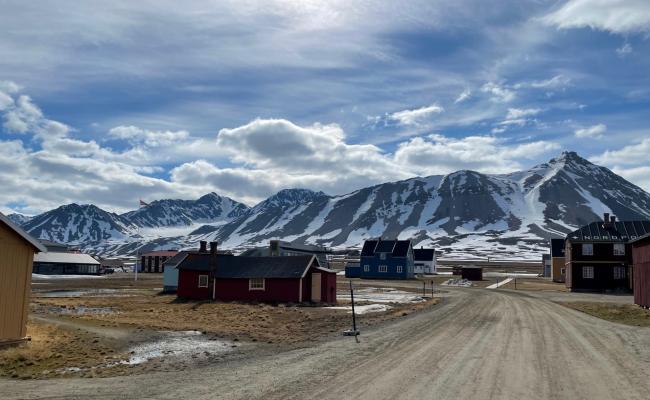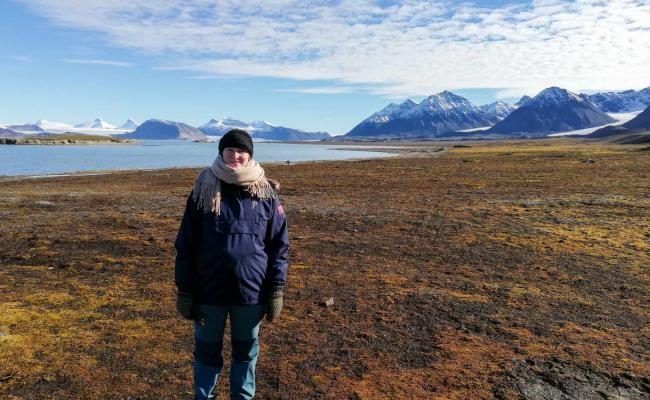Myths of Svalbard Geopolitics Debunked by Researcher

Andreas Østhagen, Senior Researcher at the Fridtjof Nansen Institute, recently published a research article highlighting the misconceptions regarding Svalbard geopolitics, most notably regarding sovereignty. (Photos of Svalbard and Andreas Østhagen: Bernt Rostad and the Fridtjof Nansen Institute, respectively)
Svalbard researcher Andreas Østhagen says certain misunderstandings about Svalbard continue to appear in media and scholarly work, of which the most common concerns Svalbard’s status as a ‘shared space’ or its legal status as being ‘ambiguous.’ He says the Norwegian government’s silence is fueling such misconceptions.
The archipelago of Svalbard is an area of interest for readers across media and scholarly work. Its location, halfway between Norway and the North Pole in the Arctic Ocean, is also of strategic interest to international actors and the subject of speculation regarding sovereignty and resources.
Recently, the Norwegian government presented a new Svalbard white paper two years before its scheduled arrival. Geopolitics was referred to as one of the driving forces behind this acceleration of the white paper.
Yet, the specifics about the government’s geopolitical concerns are kept under wraps. As the Norwegian government keeps quiet about its Svalbard concerns, misconceptions and misunderstandings continue to arise in media and scholarly work.
Arctic security studies often tend to be too general and are driven by sweeping conclusions.

Andreas Østhagen, researcher Arctic Affairs and Security Policy, Fridtjof Nansen Institute
Andreas Østhagen, Senior Researcher at the Fridtjof Nansen Institute, recently published a research article titled The Myths of Svalbard Geopolitics: An Arctic Case Study, in which he explores these misconceptions.
In the article, Østhagen states, "Common conceptions of ‘geopolitical rivalry’ being caused or even accelerated by sea ice melting are too simplistic."
"Arctic security studies often tend to be too general and are driven by sweeping conclusions that fail to take into account regional complexity and the disparity in the security challenges found north of the Arctic Circle," he writes.
Instead, he calls for greater transparency around the actual challenges regarding the Svalbard archipelago in order to prevent misconceptions.
Non-disputed sovereignty
The most common misconception concerns Svalbard's status as a 'shared space' or its legal status as being 'ambiguous.' Østhagen highlights that many researchers have questioned Norwegian sovereignty or characterized it as disputed, but that this is inaccurate.
The researcher says that Norwegian laws and regulations apply to the archipelago and that not even the militaristic Russia could claim otherwise. He also emphasizes that NATO's security guarantees apply to Svalbard.
"The notion that its sovereignty is in dispute, or that there exists a legal ‘ambiguity,’ might arise from a conflation of the dispute that concerns the Treaty’s relevance for activities beyond 12 nautical miles," writes the FNI researcher.
This dispute regarding the treaty's geographical scope is outlined below, in addition to challenges to Norwegian regulations and policy on Svalbard, according to the researcher.
The most common misconception concerns Svalbard’s status as a ‘shared space’ or its legal status as being ‘ambiguous’
Challenges to Norwegian regulations and policy on Svalbard
Østhagen states that there has been criticism by third parties of how Norway implements regulations on the islands while also abiding by the 1920 Treaty.
Norway regulates all activities on the archipelago, but citizens and companies from other signatory states can conduct activities there. However, Norway has implemented stricter or more coordinated regulations for everything from tourism to research, making activity on the archipelago more challenging for some Treaty signatories.
Some states, primarily Russia, have thus complained about limits in activity, such as Russian companies not being allowed to use helicopters for tourism, writes Østhagen.
He believes that the complaints do not directly challenge Norwegian sovereignty over Svalbard but that the sum of complaints could lead to a bigger challenge regarding how Norway adheres to and interprets the Treaty. This could again lead to accelerating misconceptions about Norway's sovereignty being threatened.
In addition, it could serve as a basis to undermine Norway's sovereignty if Russia wanted to escalate a conflict while retaining some form of plausible deniability, says Østhagen.
There is at times a tendency to overstate the geopolitical tension related to Svalbard without specifying over what, or where, this tension is taking place.
Challenges to Norwegian jurisdiction
The sea surrounding the Svalbard archipelago is also subject to challenges.
Several parties have disputed the maritime zones around Svalbard and whether the treaty should also apply at sea beyond 12 nautical miles. The Treaty itself only refers to 'territorial waters,' which are 12 nautical miles from the baseline.
In 1975, coastal states were granted the right to a 200-mile exclusive economic zone (EEZ) beyond the nation's territorial sea. Norway faced resistance in trying to establish such a zone around Svalbard.
Thus, Norway chose to establish a fisheries protection zone (FPZ) around Svalbard in 1977, in which access to fisheries was based on activity in the previous decade.
Although this was to avoid conflict with other states regarding the interpretation of the treaty, there has been some resistance regarding this solution.
The snow crab and cod quota cases illustrate this conflict and how competition for access to resources may intensify.
Østhagen also considers the dispute at sea a concern regarding a possible escalation between Russian vessels and the Norwegian Coast Guard in the FPZ.
Russian vessels are allowed to fish in the zone, but the Russian state has made a point of not recognizing Norwegian jurisdiction to inspect and arrest in these waters.
"The tenser the wider security relations between Norway and Russia, the greater are fears that such small-scale incidents at sea involving the Norwegian authorities and Russian actors could escalate out of proportion," the researcher writes.
Calls for more clarity
In an op-ed in Dagens Næringsliv, Østhagen says that the Norwegian government must be more clear on what the actual challenges on Svalbard are. Doing so would prevent an increasing number of misconceptions about geopolitics and Svalbard.
As High North News has previously reported, researcher Arild Moe says the new Svalbard white paper primarily affirms Norwegian jurisdiction over the archipelago. The white paper seeks to assert that activity on Svalbard is subject to Norwegian laws and regulations.
However, Østhagen believes it lacks transparency toward the Norwegian people on why such measures are deemed necessary. Thus, misconceptions arise.
"There is at times a tendency to overstate the geopolitical tension related to Svalbard without specifying over what, or where, this tension is taking place," Østhagen writes in his research.
You can read the full article, including an analysis of the military use of Svalbard in an East-West conflict and the misconception of Svalbard being a demilitarized area, here.





